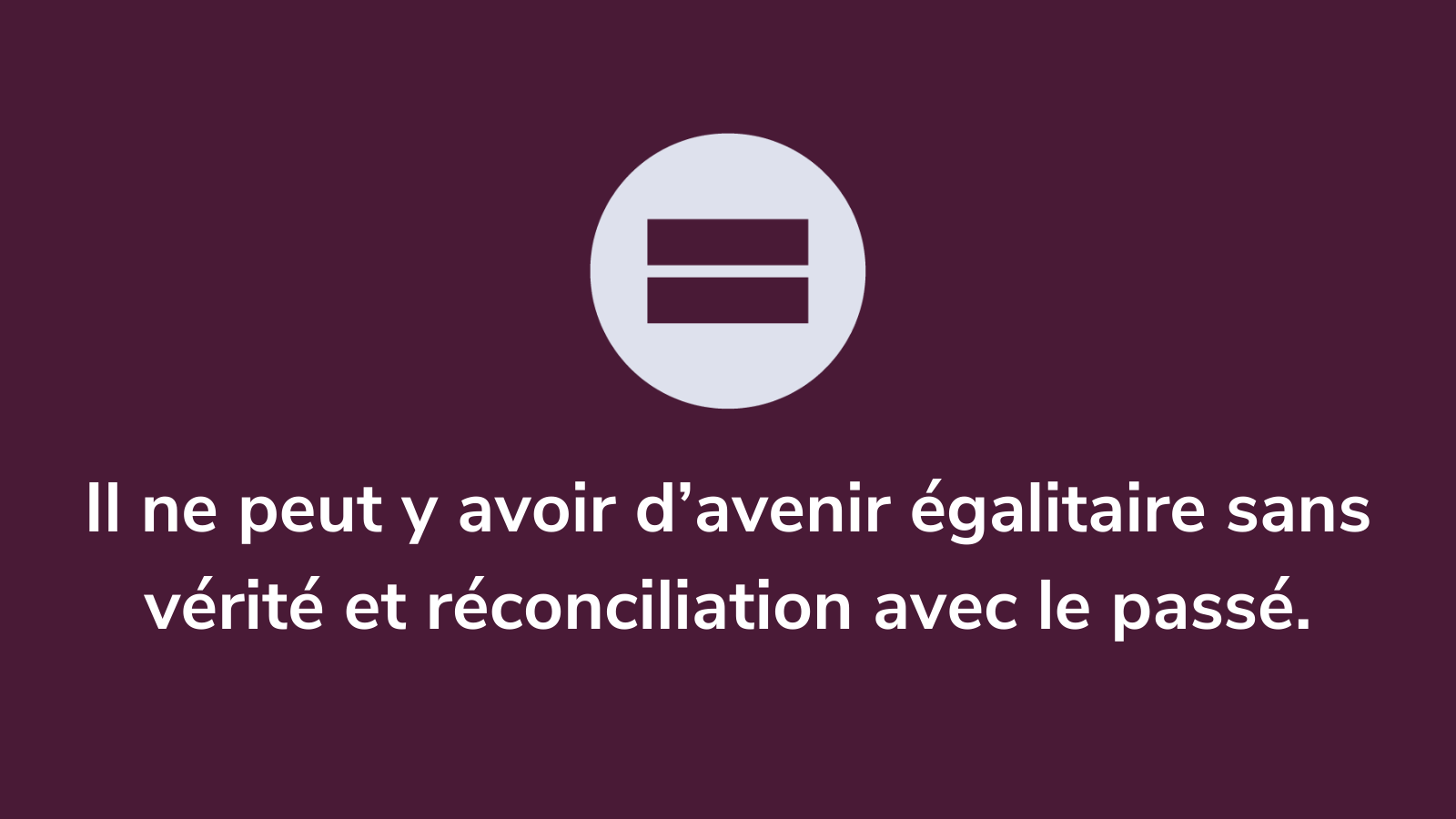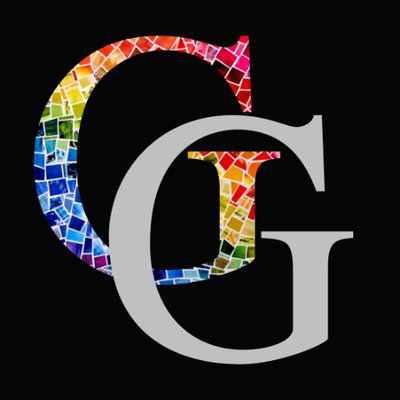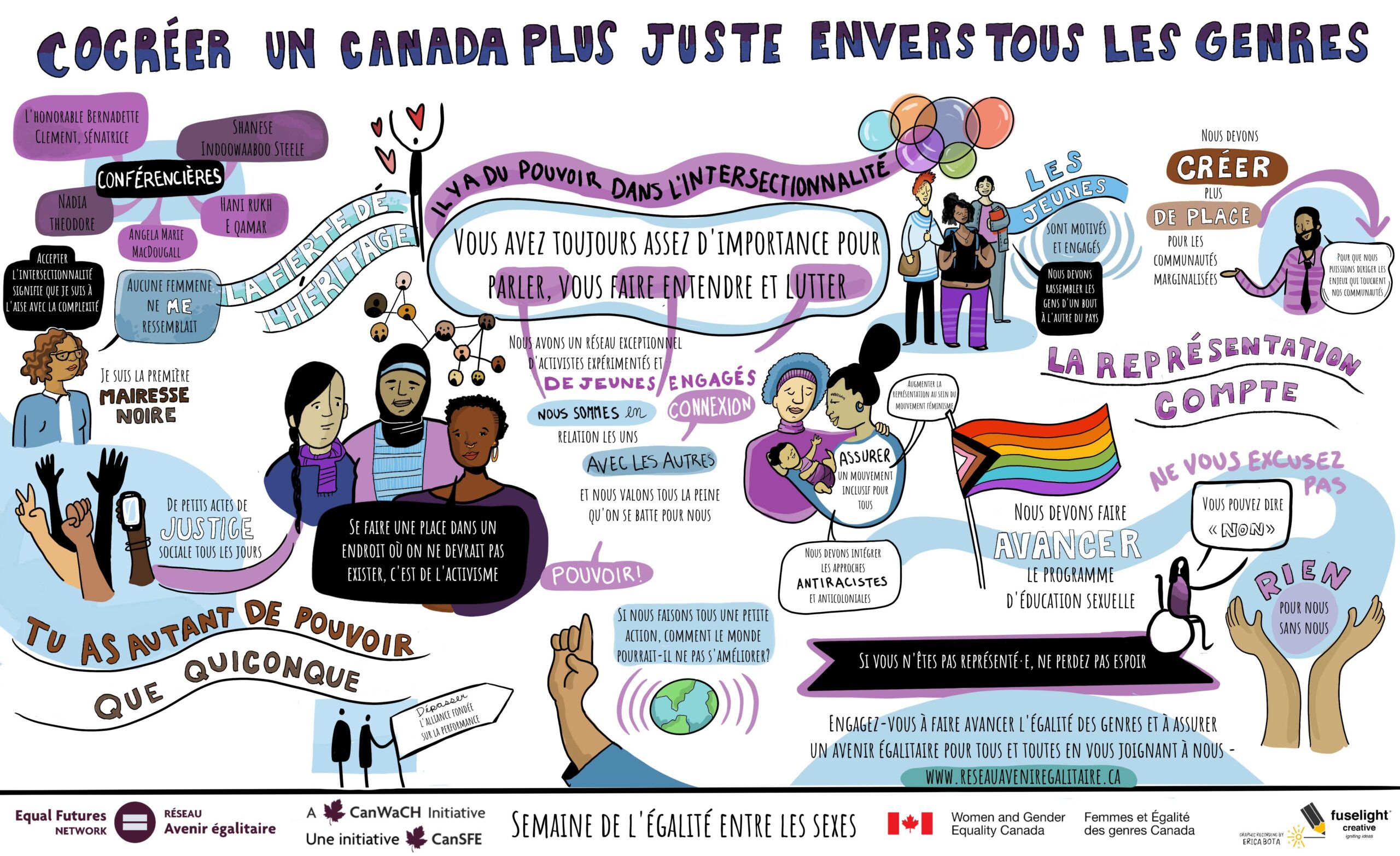
En tant que colons sur ce territoire, nous avons la responsabilité de nous engager tout au long de notre parcours à faire preuve d’alliance significative, et à réévaluer et reconsidérer notre position et notre pouvoir dans les espaces que nous occupons.
Le Réseau Avenir égalitaire, avec le soutien du Firelight Group, a compilé une liste de ressources pour mieux comprendre les impacts continuels du colonialisme, dont l’héritage des pensionnats autochtones et le traumatisme intergénérationnel, et pour mieux apprécier les cultures autochtones en soutenant le travail de leaders, d’agent·es du changement, d’artistes, d’autrices et d’auteurs ainsi que de créatrices et créateurs autochtones.
Veuillez noter que quelques-unes de ces ressources sont accessibles en anglais uniquement.
Rapports et publications
Commission de vérité et réconciliation du Canada : 94 appels à l’action
Rapport et recommandations de l’ENFFADA
150 Acts of Reconciliation of the Last 150 Days of Canada’s 150 by Crystal Fraser and Sara Komarnisky published on ActiveHistory.ca
5 Things You Need to Know About Solidarity in Reconciliation: Calling in White Settler Canadians by Rebecca Tan published on 4Rs Youth Movement
Whose Land Is It Anyway? A Manual for Decolonization by the Federation of Post-Secondary Educators of BC (FPSE)
Stolen Lives: The Indigenous Peoples of Canada and the Indian Residential Schools, Chapter 8: White Paper, Red Paper by Facing History and Ourselves
Indigenous Peoples: A Guide to Terminology by Indigenous Corporate Training Inc.
Nation to Nation and why it matters by Sara Mainville
National Day of Truth and Reconciliation: How can settlers meaningfully be an effective ally to Indigenous people? by Sabrina FIelds
Kina Gwaa Gegoo Gzhe-Mnidoo Gaa Bgidana Maagii’ing (Geographies of Embodiment) by Amy Shawanda
A Brief History of the Madaoueskarini Algonquin People by Christine Luckasavitch
Writing Myself into Existence: An Essay on the Erasure of Black Indigenous Identity in Canadian Education by Etanda Arden
Let’s Talk about Indigenous Mental Health: Trauma, Suicide & Settler Colonialism by Michaela McGuire – Jaad Gudgihljiwah
Formations et cours en ligne gratuits
Certificate of Reconciliation Studies, First Nations University of Canada
Indigenous Cultural Safety Collaborative Learning Series, Provincial Health Services Authority
San’yas Cultural Safety Training, Provincial Health Services Authority
Principled Engagement with Indigenous People, Indigenous Anti-Racism
Community & Government Organizations Courses, Reconciliation Education
Decolonial and Inclusivity Workshops (Decolonize Together), Nikki Sanchez
Reconciliation through Indigenous Education, University of British Columbia
Indigenous Canada, University of Alberta
Ressources pour orienter le changement organisationnel
United Nations Declaration on the Rights of Indigenous Peoples (UNDRIP)
Decolonization Toolkit, VIDEA
Livres
Le droit au froid, de Sheila Watt-Cloutier
Medicine Unbundled: A Journey through the Minefields of Indigenous Health Care by Gary Geddes
21 Things You May Not Know About The Indian Act by Bob Joseph
The Inconvenient Indian: A Curious Account of Native People in North America by Thomas King
Seven Fallen Feathers: Racism, Death, and Hard Truths in a Northern City by Tanya Talaga
Balladodiffusions
Spilling Labrador Tea Under Cedar Trees
Unreserved with Rosanna Deerchild
11 Indigenous podcasts for your listening pleasure
Vidéos, films et documentaires
L’eau sale (accessible sur Netflix)
Je m’appelle humain (accessible sur TouTv)
Cinéma autochtone, Office national du film
There’s a massive free catalogue of Indigenous films online — and we have 6 picks to get you started, CBC Arts
Nouvelle et sources médiatiques autochtones
Espaces autochtones – Radio-Canada
Aboriginal Peoples Television Network (APTN)
Cinéma autochtone, Office national du film
Créatrices et créateurs autochtones à suivre sur les réseaux sociaux
Indigenous Feminist Collective
Future Ancestors Services Inc.
Cette ressource est évolutive et se bonifiera au fil du temps. Vous connaissez d’autres ressources? Aidez-nous à les réunir et à les partager en nous écrivant à info@CanWaCH.ca.
Le Réseau Avenir égalitaire reconnaît que les peuples autochtones sont les gardiens traditionnels de l’Île de la Tortue, qu’on appelle également le Canada.






